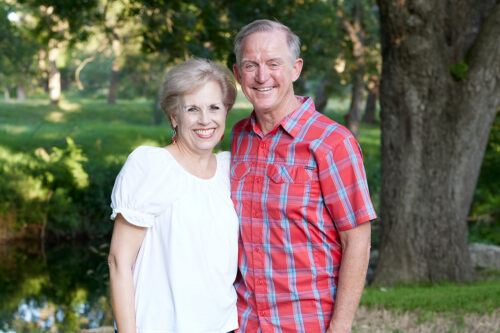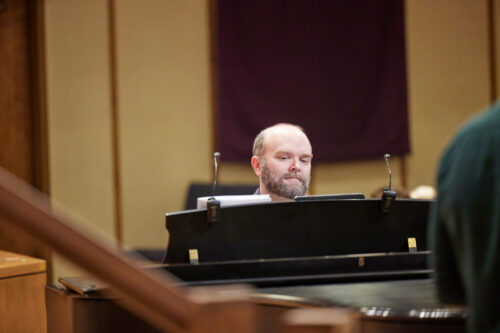Texas Tech University Climate Scientist Katharine Hayhoe shared her views on climate change with a large Covenant crowd late in April. Katharine said climate change is not an environmental issue. “Climate change is a humanitarian issue; it is an issue of loving our neighbor, of loving others as Christ loves us.”
Katharine was focused not on the right or left of the topic, but on the “crucial conversation to learn how our faith informs our being and how God might be calling us to address cultural and political issues that are bearing down on us.”
Or, in the words of Jill Williams when she preached on Earth Day, “We need to figure out what it means to steward God’s good creation as Christians.”
Is Global Warming Real?
Katharine said that the favorite question she is asked is ‘Do you believe in global warming?”
“My answer usually surprises people. I say, ‘no, I don’t actually. I don’t believe in it, it’s not some type of religion.’”
She then explained that faith is the substance of things that we hope for, the evidence of things we don’t see. Science is the opposite. It is the substance of what is here and now, and the evidence of what we can observe.
But it’s cold outside!
To get to the bottom of the global warming question, you have to research if the climate is even changing. Climate is the long-term average of weather over 20 to 30 years. To see changes, one has to add up temperature, rainfall and wind every single day of the year for at least 20 years, and then figure out if the long-term average is changing.
Katharine pointed out what is happening in God’s creation: “Heat waves are more frequent, more water is available, glaciers are melting, hurricanes are getting stronger not more frequent. All kinds of evidence show that it is getting warmer.”
In fact, Katharine said there are more than 26,000 indicators of a warming planet. Climate scientists don’t automatically think humans are causing it. They study all the natural reasons why climate changes. They look at energy from the sun, volcanoes, all kinds of things have caused climate to change in the past.
Could it be the sun? If the temperature is going up and the energy from the sun is also increasing, then we getting warmer because of the sun. But over the long-term, the sun’s energy is going down. Katharine said the sun might be going into a minimum period. Measuring by the sun, it should be getting cooler.
Could it be natural cycles? Katharine said natural cycles operate according to strict rules. Natural cycles can’t just create energy out of nothing, they can move it around. If the air is getting warmed, that heat has to be coming from somewhere in the natural cycles. Scientists know it’s not coming form earth’s core. The only other place it can get heat is the ocean. The atmosphere’s heat content is going up while the heat content of the ocean has gone up 20 times more.
“There are crazy changes happening in the ocean,” Katharine said.
Could it be the orbit of the earth around the sun? Over the last 6,000 years, we were actually starting to slowly gradually cool. Scientists predicted that another ice age was coming … until something happened.
“So, it’s not the sun, it’s not natural cycles, it’s not earth’s orbit, and it’s not volcanoes because they actually cool the earth. So now we look at: What if it were humans?”
Humans are pumping more carbon dioxide into the world. This is important because our plant already has a natural blanket made up of naturally recurring heats and gasses that keeps it 60 degrees F warmer than it would be without it. “The problem is that by digging up and burning coal and oil, we are wrapping another blanket around the planet. That is why it’s running a fever.”
After answering all those questions, Katharine said, yes, our climate is changing and it does look like it’s us.
Why should I care about climate change? A Biblical Perspective
The number on reason climate change matters is because it takes all of the natural risks that we already face – hurricane, drought, heavy rain, flood, heat waves, wild fires – and basically puts them on steroids. “It takes risks and amps them up,” Katharine said. “Our droughts are getting stronger. Our heavy rain events are more frequent. Climate change is taking our extremes and stretching them. It takes the natural risks that we already face and makes them worse.”
These climate changes then affect our economy, our agriculture and our food, our insurance rates – all kinds of aspects of our lives and the places we live. And these issues disproportionately affect the poorest and most vulnerable people.
“The reason I care about climate change is because it affects all the other things I care about so much. God has created us to be people to love others as we have been loved and part of that is to make sure others are not suffering. We as Christians need to care most about this issue because it relates directly to what God has made us to be.”
Climate change has many negative effects: contaminated water, flooding, and ultimately our health. “Did you know that one in six deaths is linked to pollution of air or water or soil? Air is polluted from burning fossil fuels. The majority are people who are poor and vulnerable.
“One of the biggest disservices is being told that climate change is an environmental issue. It is a humanitarian issue, an issue of loving our neighbor, of loving others as Christ loves us, a water issue, a food issue, a people issue.
“If we are people defined by our love for each other, if we’re this type of person, then what should be doing? What can we do?
What the most important thing? We can talk about it. Nobody talks about it. How can we talk about a changing climate? We can talk about it by doing two things. We can speak from the heart, not the head. We can talk about why we care, how it connects to our hearts and then talk about what we can do together to fix it.
Climatecaretakers.org offers simple ideas that each one of us can do. “Caring about God’s creation – people and other living things – is not something that you only care about if you are liberals, it’s who we are as Christians because God has given us responsibility over this planet. We are here to love others as we love ourselves. Caring for the planet is a general expression of our faith, the faithful acceptance of our responsibility, and a true expression of God’s love
Katharine provided several websites and videos for further information on the subject.
- Video of Katharine and her husband talking about climate change
- Katherine Hayhoe Lecture
- Katherine Hayhoe Sermon
- The Liturgists Podcast Interview
- Katherine's YouTube Channel
- Links to organizations she mentioned in her talk:



